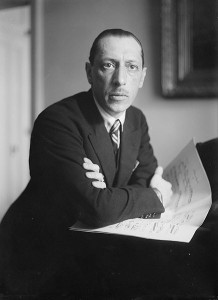Stravinsky, Symphony of Psalms

I count this among the works that I once knew well and then let languish. It seems to be a long list, which I guess is to be expected after spending years listening voraciously as a student, and then turning to other professional pursuits. But reawakening one’s memory of music can be more satisfying than learning it the first time.
Symphony of Psalms was written in 1930 during Stravinsky’s neoclassical period. Like many composers, Stravinsky’s works tend to divide into distinct periods. Of course, it’s a bit more complicated than that, but the stylistic shifts that mark Stravinsky’s periods are rather pronounced, from a late Romantic period, to the avant-garde, to neoclassicism, to serialism.
Commissioned for the 50th anniversary of the Boston Symphony, Symphony of Psalms bears little resemblance to a symphony, despite its name. It is more akin to a Baroque choral piece with polyphonic writing and equal roles assigned to chorus and orchestra. The three movements draw their text from Psalm 39:12-13 for the first movement, Psalm 40:1-3 for the second movement, and Psalm 150 for the final movement. (Stravinsky used to Latin Vulgate text, which numbers those Psalms as 38, 39, and 150.) The second movement is a double fugue: the orchestra begins with one exposition (3:18) and the chorus enters with the second theme (5:05).
Stravinsky wrote of the final movement:
The allegro in Psalm 150 was inspired by a vision of Elijah’s chariot climbing the Heavens; never before had I written anything quite so literal as the triplets for horns and piano to suggest the horses and chariot.
Yet this declaration comes from the man who famously wrote that music is, by its nature, powerless to express anything at all! We can’t get into all of that here, other than to say that Stravinsky wrote with a certain objectivity or detachment, which increased as he got older. Still, this much-cited quote tends to lead us astray when we approach his music.
Bernard Holland, writing in the New York Times, called this work “the most chastely touching of all 20th-century religious works.” I might not go quite to that extreme, but keep in mind that Stravinsky was a devout Orthodox Christian who viewed music as one of the Church’s greatest assets, and who also said:
One hopes to worship God with a little art if one has any, and if one hasn’t, and cannot recognize it in others, then one can at least burn a little incense.



